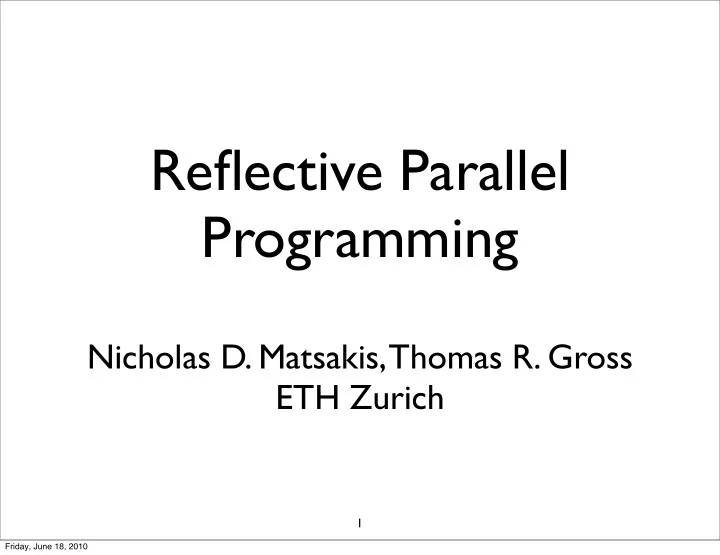

Querying the Schedule a.end.hb(b.start)? a true (lock) a.locks(lock)? true b.end.hb(a.start)? b b.locks(lock)? 23 Friday, June 18, 2010
Querying the Schedule a.end.hb(b.start)? a true (lock) a.locks(lock)? true ? b.end.hb(a.start)? b b.locks(lock)? 23 Friday, June 18, 2010
Querying the Schedule a.end.hb(b.start)? a true (lock) a.locks(lock)? true ? b.end.hb(a.start)? b false b.locks(lock)? 23 Friday, June 18, 2010
Querying the Schedule a.end.hb(b.start)? a true (lock) a.locks(lock)? true b.end.hb(a.start)? b false b.locks(lock)? 23 Friday, June 18, 2010
Querying the Schedule a.end.hb(b.start)? a true (lock) a.locks(lock)? true b.end.hb(a.start)? b false b.locks(lock)? false 23 Friday, June 18, 2010
Monotonicity • Edges and locks can only be added, not removed • Necessary for static analysis: • Compiler knows that edges and locks it sees cannot be removed at runtime 24 Friday, June 18, 2010
Outline • What is reflective parallel programming? • Why do we need a new model? • Intervals model • Example: Data-race detection 25 Friday, June 18, 2010
Outline • What is reflective parallel programming? • Why do we need a new model? • Intervals model • Example: Data-race detection 25 Friday, June 18, 2010
Data Race Detection • Key Idea: • User defines conditions in which a field can be accessed • Use the reflective API to determine whether conditions are met 26 Friday, June 18, 2010
Locked Fields class TheClass { final Lock theLock; @GuardedBy(theLock) String theString; ... } 27 Friday, June 18, 2010
Locked Fields class TheClass { final Lock theLock; @GuardedBy(theLock) String theString; ... } 27 Friday, June 18, 2010
Locked Fields class TheClass { final Lock theLock; @GuardedBy(theLock) String theString; ... } 27 Friday, June 18, 2010
Locked Fields class TheClass { final Lock theLock; @GuardedBy(theLock) String theString; ... } 27 Friday, June 18, 2010
Locked Fields class TheClass { final Lock theLock; @GuardedBy(theLock) String theString; ... } 27 Friday, June 18, 2010
Dynamic Checking void setString() { assert current.locks(theLock); theString = "..."; } 28 Friday, June 18, 2010
Dynamic Checking void setString() { assert current.locks(theLock); theString = "..."; } 28 Friday, June 18, 2010
Dynamic Checking void setString() { assert current.locks(theLock); theString = "..."; } 28 Friday, June 18, 2010
Dynamic Checking void setString() { assert current.locks(theLock); theString = "..."; } 28 Friday, June 18, 2010
Static Checking void staticCheck() { Interval x = interval { assert current.locks(theLock); theString = "..."; } x.addLock(theLock); x.ready(); } 29 Friday, June 18, 2010
Static Checking void staticCheck() { Interval x = interval { assert current.locks(theLock); theString = "..."; } x.addLock(theLock); x.ready(); } 29 Friday, June 18, 2010
Static Checking void staticCheck() { Interval x = interval { assert current.locks(theLock); theString = "..."; } x.addLock(theLock); x.ready(); } 29 Friday, June 18, 2010
Static Checking void staticCheck() { Interval x = interval { assert current.locks(theLock); theString = "..."; } x.addLock(theLock); x.ready(); } 29 Friday, June 18, 2010
Static Checking void staticCheck() { Interval x = interval { assert current.locks(theLock); theString = "..."; } x.addLock(theLock); x x.ready(); } 29 Friday, June 18, 2010
Static Checking void staticCheck() { Interval x = interval { assert current.locks(theLock); theString = "..."; } x.addLock(theLock); x x.ready(); } 29 Friday, June 18, 2010
Static Checking void staticCheck() { Interval x = interval { assert current.locks(theLock); theString = "..."; } x.addLock(theLock); x x.ready(); (theLock) } 29 Friday, June 18, 2010
Static Checking void staticCheck() { Interval x = interval { assert current.locks(theLock); theString = "..."; } x.addLock(theLock); x x.ready(); (theLock) } 29 Friday, June 18, 2010
Static Checking void staticCheck() { Interval x = interval { assert current.locks(theLock); theString = "..."; } x.addLock(theLock); x x.ready(); (theLock) } 29 Friday, June 18, 2010
Static Checking void staticCheck() { Interval x = interval { assert current.locks(theLock); theString = "..."; } x.addLock(theLock); x x.ready(); (theLock) } 29 Friday, June 18, 2010
Guard Objects • Our compiler automatically enforces these kind of checks using guard objects • Guard object defines methods that check each read and write for validity • When possible, checks are performed statically 30 Friday, June 18, 2010
Guard Object Annotations class TheClass { final Lock theLock; @GuardedBy(theLock) String theString; ... } 31 Friday, June 18, 2010
Guard Object Annotations class TheClass { final Lock theLock; @GuardedBy(theLock) String theString; ... } 31 Friday, June 18, 2010
Guard Object Annotations class TheClass { final Lock theLock; @GuardedBy(theLock) String theString; ... } 31 Friday, June 18, 2010
Custom Guards • Example Conditions • Written only by one interval • Dynamic monitoring • Lock only on writes, not reads • Select lock dynamically 32 Friday, June 18, 2010
Summary • User defines conditions to access a field by writing code against the reflective API • Compiler runs checks statically if possible • Runtime can run checks with live schedule 33 Friday, June 18, 2010
Related Work • Smalltalk • Reflective objects for stack frames, etc • Debuggers and other tools require no special support from VM • Traditional threading model • More in the paper 34 Friday, June 18, 2010
Conclusion • Reflective parallelism empowers users: • Custom tools for safety checking and monitoring • Reflective parallelism as foundation for static analysis: • Seamless integration of static and dynamic checks 35 Friday, June 18, 2010
Thank You • Intervals library is available for download: • http://intervals.inf.ethz.ch 36 Friday, June 18, 2010
Spare Slides 37 Friday, June 18, 2010
Schedule Model Hierarchical Structure 38 Friday, June 18, 2010
Illegal Additions • Schedule is being built and executed simultaneously • Certain additions are illegal 39 Friday, June 18, 2010
Adding Edges void method( a Interval a, Interval b) { a.end.addHb(b.start); b } 40 Friday, June 18, 2010
Adding Edges void method( a Interval a, Interval b) { a.end.addHb(b.start); b } What if b had already begun execution? 40 Friday, June 18, 2010
Adding Edges c void method( a Interval a, Interval b) { a.end.addHb(b.start); b } If method is part of c, b cannot have started. 41 Friday, June 18, 2010
Recommend
More recommend